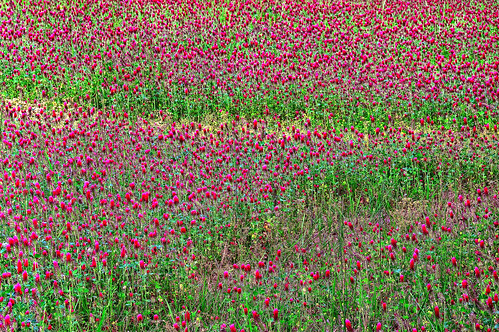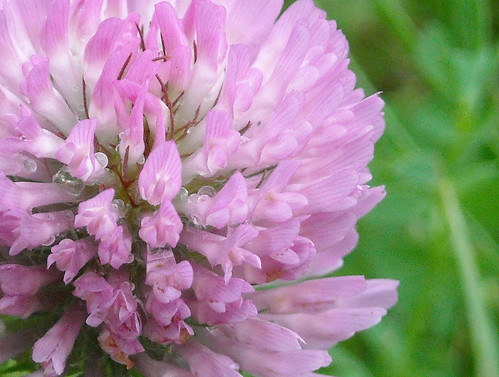
Trifolium Pratense, otherwise known as Red Clover, is an herbaceous perennial member of the legume family that is native to Europe, Western Asia, and Northwest Africa. This gorgeous bulb-like flower with honey scented pink petals has been long revered for its cancer fighting properties, however today it is most often found as a leguminous crop to eventually be used for livestock fodder. The nitrogen fixing properties found in its deep roots has made it a favorite for gardeners and farmers alike, its ability to stop erosion and fix nutrient depleted soil has made it an invaluable resource for soil health.

Upon maturity Red Clover can rapidly reach up to 2 feet in height and this unassuming flower has a long history as a medicinal herb that may have been forgotten in contemporary times. The ancient Chinese would burn the dried plant as cleansing incense, the Irish used the hot tea made from Red Clover flowers as a winter cold deterrent, in the 1917 Health from Field to Forest it was listed as ‘one of the best blood purifiers on earth’, and in the 30’s concentrated concoctions of Red Clover were placed on tumorous growths to encourage the alleviation of cancer; in fact the National Cancer Institute has substantiated Red Clover’s cancer fighting properties.

Red Clover is full of nutritional properties, containing significant levels of calcium, iron, magnesium, manganese, phosphorus, potassium, zinc, beta carotene and vitamins B3, C, and E. Red Clover stimulates the body’s eliminating systems, encouraging the production of bile and digestive fluids which helps liver and kidney function as well as increasing the efficiency of digestion and the elimination of waste accumulated within the stomach and intestines. Red Clover helps alleviate excess mucus, relaxes the body, relieves arthritis pain, is especially useful as treatment for menopause and the unwanted monthly symptoms of PMS. Red Clover has also been successfully used in helping weakened immune systems, skin complaints, debilitating and invasive diseases.

Red Clover is overall a wonderful gentle tonic but should be avoided when using blood thinner medication. The best way to enjoy the benefits of Red Clover is steep the dried leaves creating a warm cup of tea at the end of the day (also tastes excellent cold for warmer months), sweetened to taste.
Red Clover by Carey Newton
Please Note: Information provided here is not to replace the medical advice of your physician and is for educational purposes only

